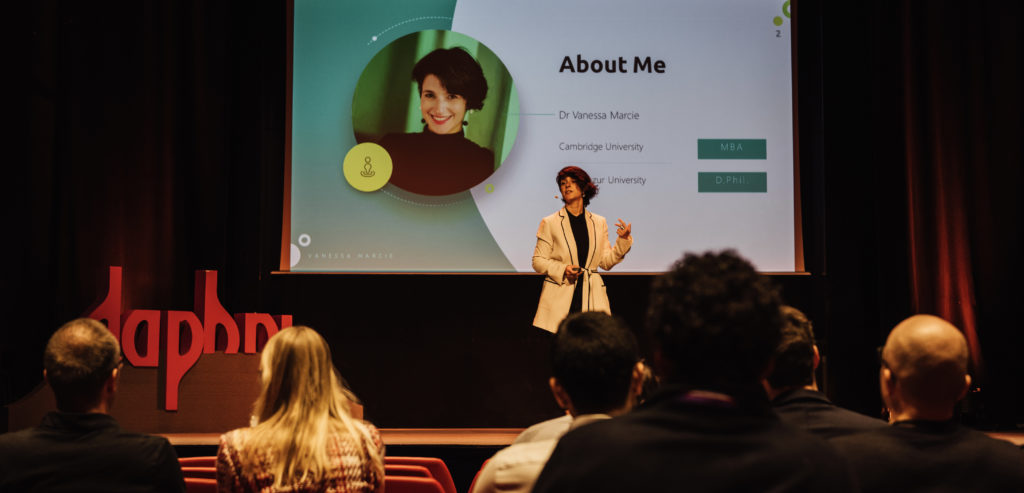Dr Vanessa Marcié founded the consultancy start-up Leading With Humour following research she conducted during her Cambridge Executive MBA Individual Project. Her research, supervised by the late Professor Sucheta Nadkarni, Director of the Wo+Men’s Leadership Centre, was expanded and developed into the methodologies Vanessa uses today to help her clients lead more effectively.

Humour is an underrated and underutilised corporate asset. It can have a tremendous impact in transforming organisational culture and help employees work better together.
We tend to think our sense of humour is innate: that we are either born with it or not. I believe everybody has a sense of humour but, as with all leadership skills, some people are better equipped than others. However, it doesn’t mean we can’t improve our ability to use humour, and that we can’t learn to use it purposefully to achieve specific professional outcomes.
Promoting healthier organisational cultures
In many workplaces, seriousness is expected, promoted and revered to the point that we all have to leave part of our personality at the door to conform to what is expected of us. Who has established this standard of seriousness in our organisations? It is an underwritten rule that can foster toxic cultures, burnout and bullying.
Absence and absenteeism are a significant problem. In the UK, businesses lose 6.9 days a year per employee because of absenteeism at an estimated cost of £554 per employee. Humour, in the workplace and our personal lives, improves health and reduces stress by relaxing muscles, boosting immunity, and releasing endorphins, which help employees feel burned-out. Employees under pressure are more likely to take sick leave, so a funnier and less stressful workplace is an excellent way to prevent that.

That is just one of the many benefits of humour. I founded Leading With Humour because I believe work should be the adult equivalent of a playground. We should be able to bring our full self to the office, be free to experiment, innovate, be creative and have fun. There is no reason we can’t deliver and be a high performer without taking ourselves too seriously.
Like comedian and former United States Senator Al Franken, I believe humour and seriousness are not in opposition to each other.
Unleashing creativity and confidence, and improving self-perception
I coach, train and advise leaders and organisations to turn humour into a superpower. It is such a powerful leadership skill! We bridge science, business and entertainment to apply the science of humour to leadership. The science, much of which I share in my workshops, is convincing leaders that incorporating humour into their professional toolkits is key to empowering people and transforming organisations. And best of all: it’s fun!
As Mark Twain said, humour is mankind’s greatest blessing. Leaders always benefit from exploring and understanding the types of humour that work best for them and, more importantly, how to strategically use humour to their advantage.
As a leader, you know it’s lonely on the top. There is a certain social distance attached to your status and sometimes information retention. We don’t say everything to the boss. But using humour judiciously can be powerful stuff. It can defuse tension, impart confidence, increase likeability and bridge gaps in status.
Leading With Humour sessions are designed to unleash creativity, confidence, and improves self-perception. They are a mix of theory – helping you learn essential humour and leadership concepts and harness the power of humour to become a better leader – and practical exercises to help break the fear of public speaking and develop an ability to use humour to get out of the most uncomfortable situations.
And if you’re not yet convinced that you can do serious work without taking yourself seriously, in 2018 Southwest Airlines – an organisation celebrated for its dedication to its strong and collaborative culture – reported that its operating profit margin was the highest in the world, making it one of the most profitable airlines. Southwest Airlines is an exemplary achievement, in large part due to the place of humour in its corporate culture.


Leave a Reply